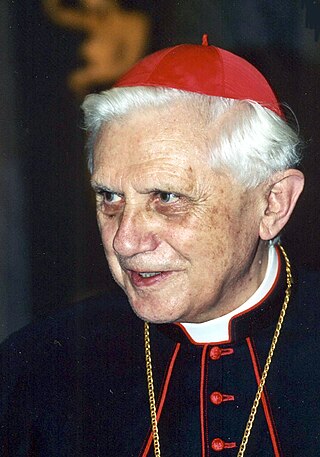
Pope Benedict XVI was head of the Catholic Church and sovereign of the Vatican City State from 19 April 2005 until his resignation on 28 February 2013. Benedict's election as pope occurred in the 2005 papal conclave that followed the death of Pope John Paul II. Upon his resignation, Benedict chose to be known as "Pope emeritus", and he retained this title until his death in 2022.

The Tridentine Mass, also known as the Traditional Latin Mass or the Traditional Rite, is the liturgy in the Roman Missal of the Catholic Church codified in 1570 and published thereafter with amendments up to 1962. Celebrated almost exclusively in Ecclesiastical Latin, it was the most widely used Eucharistic liturgy in the world from its issuance in 1570 until the introduction of the Mass of Paul VI.

Jean-Baptiste Henri-Dominique Lacordaire, OP, often styled Henri-Dominique Lacordaire, was a French ecclesiastic, preacher, journalist, theologian and political activist. He re-established the Dominican Order in post-Revolutionary France. Lacordaire was reputed to be the greatest pulpit orator of the nineteenth century.
An encyclical was originally a circular letter sent to all the churches of a particular area in the ancient Roman Church. At that time, the word could be used for a letter sent out by any bishop. The word comes from the Late Latin encyclios. The term is now primarily associated with papal encyclicals.
Americanism was, in the years around 1900, a political and religious outlook attributed to some American Catholics and denounced as heresy by the Holy See.
Communion and Liberation, since 1980 officially Fraternity of Communion and Liberation, it is an international Catholic movement founded in 1954 by Fr. Luigi Giussani as Student Youth, with the aim of presenting the Christian event in a way which is in tune with contemporary culture, making it a source of new values for the modern world. The movement is currently present in ninety countries on nearly every continent.

The Diocese of Fort Wayne–South Bend is a Latin Church ecclesiastical territory, or diocese, of the Catholic Church in north-central and northeastern Indiana in the United States.

Maurice Blondel was a French philosopher, whose most influential works, notably L'Action, aimed at establishing the correct relationship between autonomous philosophical reasoning and Christian belief.

Richard Peter McBrien was a Catholic priest, theologian, and writer who was the Crowley-O'Brien Professor of Theology at the University of Notre Dame near South Bend, Indiana. He authored twenty-five books, including the popular Catholicism, a reference text on the Church after the Second Vatican Council.

Joseph Ratzinger (1927–2022) was named by Pope John Paul II on 25 November 1981 as prefect of the Congregation for the Doctrine of the Faith (CDF) formerly known as the Holy Office and, especially around the 16th century, as the Roman Inquisition.
George Gilmary Higgins was an American labor activist and Catholic clergyman known as the "labor priest". He was a major force in the Catholic Church's support for Cesar Chavez and his union movement.

Daniel Robert Jenky, CSC is an American prelate of the Roman Catholic Church who served as bishop of the Diocese of Peoria in Illinois from 2002 until his retirement in 2022. He also served as an auxiliary bishop of the Diocese of Fort Wayne-South Bend in Indiana from 1997 to 2002.

The Apostolic Nunciature in the Philippines is a top-level diplomatic mission assigned by the Holy See to the Philippines, located at 2140 Taft Avenue, Malate, Manila.

Marc Sangnier was a French Roman Catholic thinker and politician, who in 1894 founded Le Sillon, a social Catholic movement.
Le Sillon was a French political and religious movement founded by Marc Sangnier (1873–1950), which existed from 1894 to 1910. It aimed to bring Catholicism into a greater conformity with French Republican and socialist ideals, in order to provide an alternative to Marxism and other anticlerical labour movements.

Carlo Maria Viganò is an Italian traditionalist Catholic archbishop who served as Apostolic Nuncio to the United States from 2011 to 2016 and as secretary-general of the Governorate of Vatican City State from 2009 to 2011. He is known for having publicized the Vatican leaks scandal of 2012, in which he revealed financial corruption in the Vatican, and a 2018 letter accusing Pope Francis and other Catholic leaders of covering up sexual abuse allegations against former cardinal Theodore McCarrick. In 2024, Viganò was charged by the Vatican with schism. He was declared guilty and excommunicated.

Luigi Ventura is an Italian prelate of the Catholic Church who worked in the diplomatic service of the Holy See, ending his career as Apostolic Nuncio to France from 2009 to 2019. He became a nuncio and archbishop in 1995 and served in several African countries, Chile, and Canada before being posted to Paris.

Jean-Claude Hollerich, S.J. is a Luxembourgish Catholic prelate who has served as Archbishop of Luxembourg since 2011. He was the president of the Commission of the Bishops' Conferences of the European Union (COMECE) from March 2018 to 2023. He is a member of the Jesuits.

Laudato si' is the second encyclical of Pope Francis, subtitled "on care for our common home". In it, the Pope criticizes consumerism and irresponsible economic development, laments environmental degradation and global warming, and calls all people of the world to take "swift and unified global action". The encyclical, dated 24 May 2015, was officially published at noon on 18 June 2015, accompanied by a news conference. The Vatican released the document in Italian, German, English, Spanish, French, Polish, Portuguese and Arabic, alongside the original Latin.

The Extraordinary Jubilee of Mercy was a Catholic period of prayer held from 8 December 2015, the Solemnity of the Immaculate Conception, to 20 November 2016, the Feast of Christ the King. Like previous jubilees, it was seen by the Church as a period for remission of sins and universal pardon focusing particularly on God's forgiveness and mercy. It was an extraordinary Jubilee because it had not been predetermined long before; ordinary jubilees are usually celebrated every 25 years.















